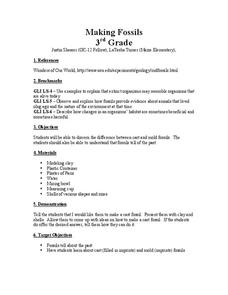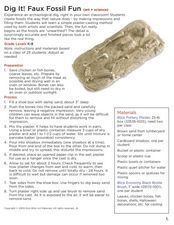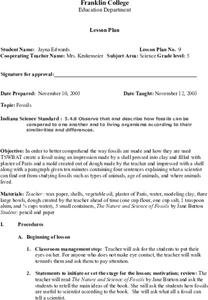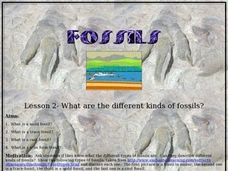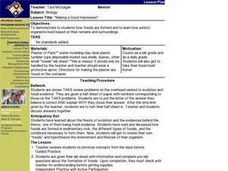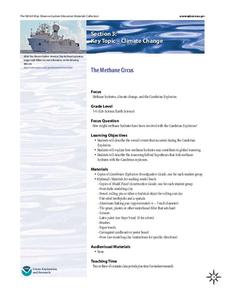Curated OER
ACTIVITY 6: MAKE A FOSSIL MOLD AND CAST and ACTIVITY 7: HOW BIG WERE PREHISTORIC ANIMALS?
Instructions for two terrific ancient history lessons for your primary paleontologists are provided in this resource. The first involves the creation of fossil cast replicas using plaster of Paris. The directions are detailed, but the...
Curated OER
Making Fossils
Third graders examine the differences between cast and mold fossils. They discuss geological time and how many fossils are millions of years old, then create a cast fossil using clay and a shell, and a mold fossil using a shell and...
Curated OER
Faux Fossil Fun
Elementary schoolers investigate how fossils are created by reproducing the process of creating an impression and filling it with a hardening material. The art lessons from this source are just fantastic! The lesson plan is well-written...
Curated OER
Fossils and our Past (part 1 of 3)
Third graders investigate how some extinct organisms resemble organisms that are still alive today. They watch and discuss the Magic School Bus video about fossils, then create clay fossil imprints, matching the imprints to plaster of...
Curated OER
Rockin? Chalk (Integrating science - make own chalk)
Learners use plaster of Paris, talc, and cornstarch to create their own chalk. They hypothesize what mixture of ingredients produce the "best" chalk. Students discuss what they think are the characteristics of the "best" chalk.
Curated OER
Fossils
Fifth graders create a fossil using an impression made with a shell pressed into clay and filled with plaster of Paris and a mold made out of dough and impressed with a shell. They also will receive a paragraph which contains four...
Curated OER
White Glue Fossils: Casts, Molds, and Impressions
Students make impressions and molds in clay and them make casts with glue. After the glue dries students remove their fossils.
Curated OER
Fossil History
Students examine the similarities and differences between living organisms and fossils. In this fossil lesson plan students reenact the process of creating a fossil.
Curated OER
Making Prehistory
Students create mock fossil records based on current scientific theories about prehistory. By learning about what fossil records teach us about different prehistoric time periods, students gain a greater understanding of theories of...
American Museum of Natural History
Buried Bones
Patience is the name of the game. Using Plaster of Paris and chicken bones, learners simulate an archeological dig site. They excavate the chicken bones over a period of several days using tools and a large amount of patience.
Curated OER
What are the Different Kinds of Fossils?
Students examine different types of fossils. In this fossil lesson, students investigate the attributes of mold fossils, trace fossils, cast fossils, and true form fossils. Students create their own fossil samples.
Curated OER
Candle-Wax Fossils: Casts, Molds, and Impressions
Students examine and define fossils. They create their own impressions and molds in clay and candle wax, making external and internal molds.
Curated OER
Making Sedimentary Rocks
Students make models of sedimentary rock layers to explain how rocks form layers and represent ancient environments. Layers of sediment and fossils are added together to simulate the environment and connections to sedimentary rocks are...
Curated OER
Back to the Past
Young scholars label fossil imprints. In this Geology instructional activity, students view fossil imprints of several items. Young scholars explain what a fossil is.
Curated OER
Earth Lesson Plans
Students gain understanding of how a fossil is formed and why they are so important. In this fossil lesson students create their own fossils.
Curated OER
Mud Fossils
Students create their own fossils in an activity using plaster of paris and a variety of objects which can be fossils, e.g. chicken bones, twigs, shells, etc. After making their fossils, they allow them to dry and discuss time and its...
Curated OER
"Making a Good Impression"
Students are shown how fossils are formed and to learn how extinct organisms lived based on their remains and surroundings. They are shown TAKS review problems on the overhead related to evolution and fossil evidence. Students discuss...
Curated OER
What We Know About Dinosaurs?
Third graders determine what can and cannot be learned from fossils. In this fossils lesson, 3rd graders discuss what can and cannot be learned from fossils, then students create and observe their fossils.
Curated OER
When Dinosaurs Ruled the World
Learners create their own fossil. In this fossil lesson, students explore dinosaurs and fossils through reading Fossils Tell of Long Ago by Aliki. Upon completion of the story, learners use modeling clay to create a cast.
Curated OER
Fossilworks
Students research fossils and fossil formation. They explain how fossils are formed, identify fossil formations and use casting plaster to produce fossil replicas.
NOAA
The Methane Circus
Step right up! An engaging research-centered lesson, the third in a series of six, has young archaeologists study the amazing animals of the Cambrian explosion. Working in groups, they profile a breathtaking and odd creature and learn...
Curated OER
Rockin' Chalk
Fourth graders access prior knowledge of rocks and minerals. In this petroglyphs lesson, 4th graders become familiar with artwork on rocks. Students create original artworks using rock art.
Curated OER
The Moon Book
In this moon instructional activity, students read the book The Moon Book and list facts about the moon and draw eclipses. Students list 10 facts and draw 3 kinds of eclipses.
Project SMART
Dinosaur Trek
Second graders investigate dinosaurs. They explore various websites, submit questions to a paleontologist online, construct cut and paste model dinosaur skeletons, develop a graph to compare dinosaurs, and label pictures from online...



